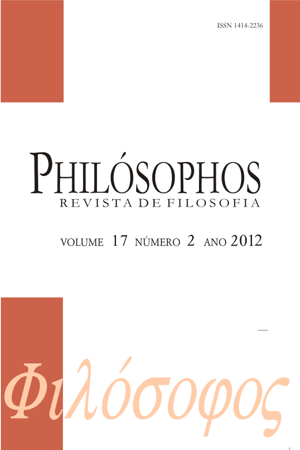MONISMO ANÔMALO, FISICALISMO, CAUSALIDADE MENTAL
DOI:
https://doi.org/10.5216/phi.v17i2.17076Palavras-chave:
mente, fisicalismo, causalidade mental, monismo anômalo.Resumo
Referindo-se a alguns aspectos do debate entre Donald Davidson e Jaegwon Kim acerca do problema da eficácia causal do mental no mundo físico, este artigo visa focalizar um ponto de tensão que parece surgir no âmbito do fisicalismo não reducionista davidsoniano, cuja expressão mais conhecida é a tese do monismo anômalo, que pretende conciliar duas alegações dificilmente conciliáveis no âmbito de uma tese fisicalista. São estas, a alegação da anomalia do mental, que afirma a autonomia do mental do sistema das leis que governam os fenômenos físicos, e a alegação de que os eventos mentais e as ações humanas fazem parte do fluxo causal dos eventos da natureza. O Monismo Anômalo parece ser uma tese epifenomenalista, pois, no Monismo Anômalo, a alegação da anomalia do mental exclui que o mental possa ter uma eficácia causal.Downloads
Downloads
Publicado
Como Citar
Edição
Seção
Licença
Autores que publicam nesta revista concordam com os seguintes termos:
- Autores mantêm os direitos autorais e concedem à revista o direito de primeira publicação, sendo o trabalho simultaneamente licenciado sob a Creative Commons Attribution License o que permite o compartilhamento do trabalho com reconhecimento da autoria do trabalho e publicação inicial nesta revista.
- Autores têm autorização para assumir contratos adicionais separadamente, para distribuição não-exclusiva da versão do trabalho publicada nesta revista (ex.: publicar em repositório institucional ou como capítulo de livro), com reconhecimento de autoria e publicação inicial nesta revista.















